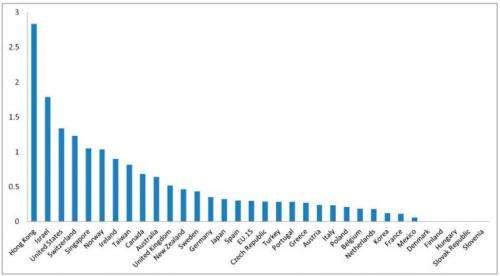January 21, 2014 report
Research shows more small business does not mean more entrepreneurs

(Phys.org) —Economists often measure rates of entrepreneurship by looking at the number of small businesses in an industry or a country. However, in a study published in the Proceedings of the National Academy of Sciences, Magnus Henrekson and Tino Sanandaji of the Research Institute of Industrial Economics in Sweden have found that small business ownership is a poor indicator of entrepreneurship. A better measure is the number of billionaires in the market, which correlates negatively with the number of small businesses and startups.
The researchers studied Schumpeterian entrepreneurs, defined as those who bring innovation to their industry and drive new growth. They noted that in the United States, most self-employed people are not entrepreneurs in this sense. Most of the self-employed run small businesses that do not grow. The majority do not have employees of their own. Previous research suggests that only between 10 and 20 percent of small businesses are innovative. The rest, such as landscaping companies, auto repair companies, restaurants, salons and child day care services, merely replicate businesses that already exist.
Henrekson and Sanandaji argued that the number of small businesses therefore does not provide an accurate measure of the number of entrepreneurs. To obtain a better measure, they looked at Forbes Magazine's annual lists of "The World's Billionaires" from 1996 through 2010. Of the 1,723 billionaires profiled, they identified 996 billionaires in 50 countries who had obtained their wealth by founding new companies. The researchers defined these as billionaire entrepreneurs.
There was a negative correlation between billionaire entrepreneurship and self-employment. Countries with the most billionaire entrepreneurs tended to have the lowest rates of self-employment. For example, Americans accounted for 40 percent of the billionaires, yet the United States has the second lowest self-employment rate of all developed countries. Within the U.S., this negative correlation occurred regionally and by industry. Boston and Silicon Valley, known for high levels of entrepreneurship, had low levels of self-employment and small business ownership compared with the natural average. Industries with the most billionaire entrepreneurs had fewer businesses with less than 20 employees.
Henrekson and Sanandaji point out that by creating large companies, entrepreneurs make it more harder for smaller businesses to thrive and grow. The emergence of corporations such as Walmart and Amazon has reduced the number of small business owners in their sectors. Large companies that do not directly compete with small businesses, such as Google and Microsoft, also decrease small business ownership by creating high paying jobs that attract people who might otherwise become self-employed.
More information: "Small business activity does not measure entrepreneurship," by Magnus Henrekson and Tino Sanandaji. PNAS, www.pnas.org/cgi/doi/10.1073/pnas.1307204111
Journal information: Proceedings of the National Academy of Sciences
© 2014 Phys.org



















